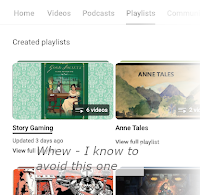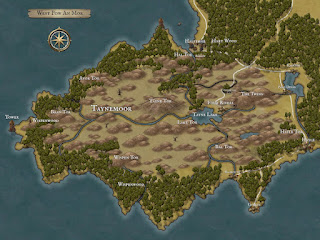|

Chain & Shield |
Thoughts and Review
A year or two ago - I became peripherally aware of Mythic Mountains RPG: a group of designers and players who shared a love of fantasy adventure and who regularly posted content - video, long-form, and social - about it. I would later be invited to join a community - one where I have been ungraciously inactive (for which, I hope, they will forgive me) - but since trying turn around, making an internet acquaintance into an internet friend, I found an 0e-compatible actual play refereed by none other than the primary voice of Mythic Mountains - at least, to whom I had spoken.
It had been a while since I had done an AP review - admittedly, I had lost a lot of love for the genre: they just didn't hold me like they use to. The luster was gone. But I gave this one a shot - I wanted to see if I just needed to dive back in: like a lone wolf finally attending a gathering and finding they liked the pack around them more than they thought. I like 0e - and Mythic Mountains was recently interviewed by my friend Kevin over at The Redcaps Podcast - so they can't be all bad. And what I found? I was not disappointed.
The Mythic Mountains RPG Original Dungeons and Dragons (OD&D/S&W/White Box etc.) YouTube playlist - a name I have abbreviated hereafter and heretofore for the benefit of pixel count - follows a continuing campaign: delving the depths of Rappan Athuk, Echoes from Fomalhaut, as well as several injections of interlude alternatives like Castle Xyntillan or Gardens of Ynn: critically acclaimed and well established OSR adventures and accouterments, well known to me by name if not by played experience. The player cast is fairly consistent and the schedule is unrelenting: a beautiful example of a campaign run right. I am forced to reminisce of how gaming use to be at my own home table, before the child-times in my own life, when food came first but adventure was a close second.
As a caveat for this review - I have not had a chance to listen through the entirety of the playlist. However, I've been through enough that I should think I have information sufficient for an opinion on it: and I continue to use it to fill the air at work or on the elliptical in the mornings prior to the start of my regularly scheduled day.
What I Liked
One of the most important things about actual plays - apart from their ability to retain an audience and be an enjoyable experience - the primary value that comes from actual plays is taking on the role of examples of play: where, in the past, one might observe and play with a group who had been playing the game already to get a feel for the experience - so also actual play casts can and should outline how the game works and feels. For the game they are playing - Mythic Mountains does a decent job. While I am not an expert on Swords & Wizardry, I have played several other games with the same 0e compatibility goal - and from there, as far as I can tell, Mythic Mountains does S&W correctly enough to learn a bit about the mechanics through osmosis.
In particular - of note in Swords & Wizardry, there is a shortage of some of the wargame aspects of the original edition: while Mythic Mountains (in my viewing so far) does not particularly engage in wargaming elements as part of the OD&D actual play playlist, they do include on regular basis overland travel - with use of a hex map for overland as well as smaller area maps when zooming in on smaller sections of the map. The inclusion of map exploration is in particular important - as while the evasion rules can get a low level party out of trouble, it's also essential - regardless of level - to include a retinue of hirelings: something that the party takes extra care to do: both in recruiting and in retaining them.
As indicated, the 0e playlist is prolific, with over 100 episodes available to the general viewer. In addition to this - if you like the cut of the table jib - at the time of this writing, there are 30 additional playlists of different games and different systems - some of which being fewer and some of which matching the scale of the playlist under review.
They are all well-labeled:
...but as of this writing, I have only paid clear attention to the specific playlist linked and listed under review: thus, I cannot speak to the nature of their content. The reader is advised to enjoy as their own taste advocates.
Further - the playlist is long. As I have confessed to point, I have not watched all of the videos: making a judgement based on the ones I have seen along the way - both older ones and new. However, this is - in my estimation - understandable - as the OD&D playlist contains over 100 videos: averaging two hours in length each. And OD&D isn't the only game that is played on the channel!
While I have not been on board for the whole of the campaign's duration - I have been aware of it for some time: and initially, I had been reluctant to write a review - in part because of the immersiveness of the actual play. They don't, offscreen, roll dice to hire mercenaries; they don't, offscreen, figure out buying/selling - instead, in session, on screen, they visit merchants, taverns, bürgermeisters - and role play the experience. This had been a turn off for me - the game is meant for dungeons! Why aren't they crawling? But in watching - in giving the AP a chance - I realized this is a selling point: not the opposite. This is the way most tables operate - sure, we joke about spending a whole session shopping, knowing full well we can't play again for two weeks: however the exaggeration derives from a real element of gameplay - one that I had, in the era of online gaming, myself forgotten. Starved of time, my own experiences tried to hyper-focus on the mechanics - doing all the "peripheral" activities in other channels prior to the game: "maximizing" the time spent at the table.
But that's a characteristic of online tabletop; not real life.
By doing these things on screen, by exploring the world personally, Mythic Mountains shows the game as a new player to the OSR might actually experience it, might actually identify with it - if coming into our corner of the hobby from more modern ones. And so while this might have been an "Aspect to Note" in the first draft of this post - under further review, the call is reversed.
Aspects to Note
None of the players play Chaotic characters. This is intentional - the referee wants nothing to do with the inner-party implications nor the in-world implications of Chaotic player characters mucking about in the game campaign. This is - to my own experience - prudent: Chaotic characters tend to be disruptive to party dynamics and more prone to damaging the table experience when in mixed company. While I'm not personally against this style of play - nor against player versus player adversarial interaction - it has to fit the table in order to execute well: and at the Mythic Mountains table, the stage is set against it.
In addition to YouTube, Mythic Mountains RPG maintains a presence on FaceBook, X (formerly Twitter), and authors articles and posts related to gaming and gaming experience on Substack.
Further - Mythic Mountains has a small catalog of fantasy adventure gaming material published on Itch.io and DriveThruRPG - which I would normally claim to be the best way to support their endeavors, but the products appear to be mainly free to download - posted and shared for the love of the hobby.
Good on you, Mythic Mountain.
Normally, this is not particularly a noteworthy difference - but it does amount to some degree of Law-mongering: that is, one of the primary motivators for the party, and one that they use to hire hirelings, is the desire to abolish Chaos: which may distract some from the gold-loop associated with typical OSR design. Again - I am not opposed to Law-mongering (I tend to be a Law-monger myself, playing Clerics of course) - but it is something you will encounter during the playlist.
Next - something that usually does get my goat - character voices.
More power to you if you enjoy them - but I don't like character voices. They are not poorly done, they distract me a little, but don't take me out of the moment - and if you are neutral on them, they won't bother you either. It's not professional voice acting - but it's also not intended to be: arguably, this is how use of character voices would work at a home game that a new player might join - so in that sense, it's beneficial: an accurate depiction of the hobby. Thus, again - something of which to be aware.
On a particularly low note - and truthfully, the most stand-out element that one must be conscious about prior to entering in to this playlist... the epic wizard hat worn by the referee.
In character, yes - appropriate to the genre, of course: but man... your cranial attire will never be as epic as this.
Setting everyone else up for disappointment in their home campaigns, Ross.
In Conclusion
Mythic Mountains RPG's Original Dungeons and Dragons playlist, primarily composed of S&W White Box as the system of choice, is a solid entry into the ever-growing library of OSR actual plays. It encompasses the breadth and width of the ruleset - which encompasses the common experience of OSR tables. S&W is not perfect - namely, S&W emulating the home table of its original author, does not contain elements of domain and overmap conflict - but that's OK. The number of tables at which I have played that incorporated those elements of play over my own experience can be counted on one hand. For that reason, I've personally rated it Chainmail, with Shield. It's a good showcasing of a good game - with pacing, experiences, and assumptions all consistent with actual game experiences.
Delve on, readers.





















